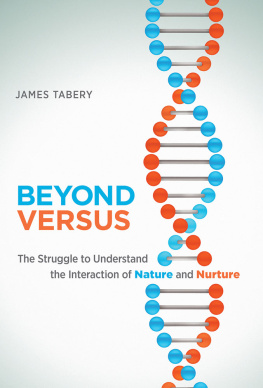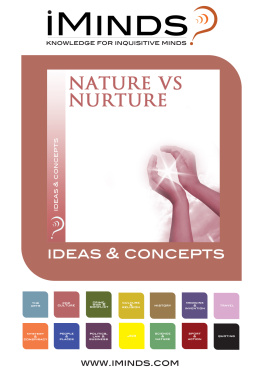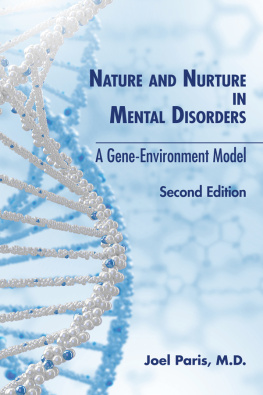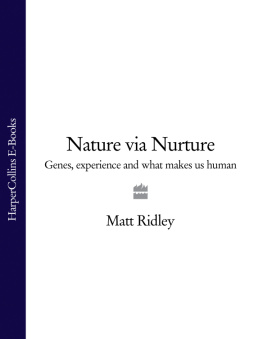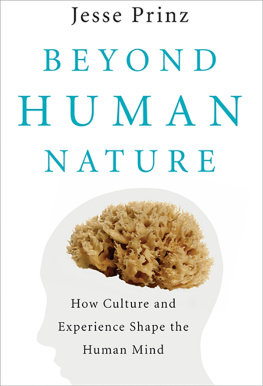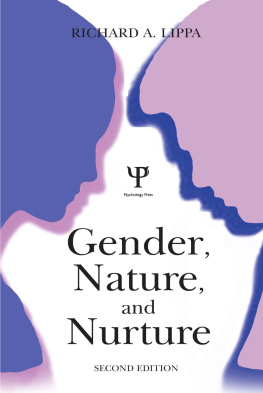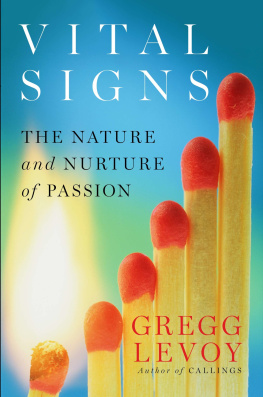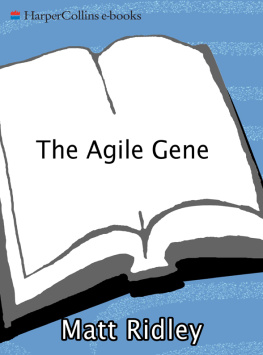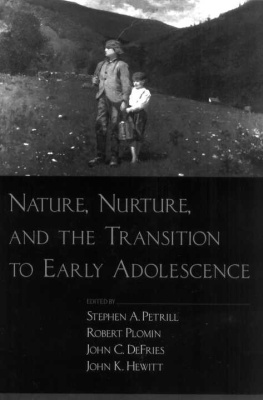Beyond Versus
Life and Mind: Philosophical Issues in Biology and Psychology
Kim Sterelny and Robert A. Wilson, Series Editors
Beyond Versus: The Struggle to Understand the Interaction of Nature and Nurture, James Tabery, 2014
Investigating the Psychological World: Scientific Method in the Behavioral Sciences, Brian D. Haig, 2014
Evolution in Four Dimensions: Genetic, Epigenetic, Behavioral, and Symbolic Variation in the History of Life, revised edition, Eva Jablonka and Marion J. Lamb, 2014
Cooperation and its Evolution, Kim Sterelny, Richard Joyce, Brett Calcott, and Ben Fraser, editors, 2013
Ingenious Genes: How Gene Regulation Networks Evolve to Control Development, Roger Sansom, 2011
Yuck! The Nature and Moral Significance of Disgust, Daniel Kelly, 2011
Laws, Mind, and Free Will, Steven Horst, 2011
Perplexities of Consciousness, Eric Switzgebel, 2011
Humanitys End: Why We Should Reject Radical Enhancement, Nicholas Agar, 2010
Color Ontology and Color Science, Jonathan Cohen and Mohan Matthen, editors, 2010
The Extended Mind, Richard Menary, editor, 2010
The Native Mind and the Cultural Construction of Nature, Scott Atran and Douglas Medin, 2008
Describing Inner Experience? Proponent Meets Skeptic, Russell T. Hurlburt and Eric Schwitzgebel, 2007
Evolutionary Psychology as Maladapted Psychology, Robert C. Richardson, 2007
The Evolution of Morality, Richard Joyce, 2006
Evolution in Four Dimensions: Genetic, Epigenetic, Behavioral, and Symbolic Variation in the History of Life, Eva Jablonka and Marion J. Lamb, 2005
Molecular Models of Life: Philosophical Papers on Molecular Biology, Sahotra Sarkar, 2005
The Mind Incarnate, Lawrence A. Shapiro, 2004
Organisms and Artifacts: Design in Nature and Elsewhere, Tim Lewens, 2004
Seeing and Visualizing: Its Not What You Think, Zenon W. Pylyshyn, 2003
Evolution and Learning: The Baldwin Effect Reconsidered, Bruce H. Weber and David J. Depew, editors, 2003
The New Phrenology: The Limits of Localizing Cognitive Processes in the Brain, William R. Uttal, 2001
Cycles of Contingency: Developmental Systems and Evolution, Susan Oyama, Paul E. Griffiths, and Russell D. Gray, editors, 2001
Coherence in Thought and Action, Paul Thagard, 2000
Beyond Versus
The Struggle to Understand the Interaction of Nature and Nurture
James Tabery
The MIT Press
Cambridge, Massachusetts
London, England
2014 Massachusetts Institute of Technology
All rights reserved. No part of this book may be reproduced in any form by any electronic or mechanical means (including photocopying, recording, or information storage and retrieval) without permission in writing from the publisher.
Library of Congress Cataloging-in-Publication Data is available
ISBN 978-0-262-02737-3 (hardcover : alk. paper)
ISBN 978-0-262-32415-1 (retail e-book)
For Mom and Dad
Preface
Every book has a nature, and a nurture.
Its nature is that germinal idea, that nascent inclination to tell a story. The germinal idea for this book sprung from my fascination with the persistence of the nature/nurture debate. On the face of it, the nature/nurture debate is a scientific debate, and so it should be a debate about verified facts and empirical evidence. But if facts and evidence were all there is to the story, then two scientists (or two disciplines of scientists) should be able to look at the same data and reach the same conclusion. The persistence of the nature/nurture debate obviously suggests there is more to this story than just that. So what then is it? My goal was to expose the underlying philosophical disagreements that could lead two people (or two disciplines) to look at the same data about genes and the environment and reach very different conclusions. These disagreements involve disputes about what certain concepts mean, debates about how explanation works in science, arguments about what methodologies supply those explanations, and controversies about the ethical implications of the conclusions. My nascent inclination was to draw on the tools of the historian of science, the philosopher of science, and the bioethicist to disentangle these underlying disagreements so as to make room for disputants who were once talking past one another to meet on common ground.
A books nurture includes all the people who nourished and shaped that germinal idea. Fortunately for me, this book was nurtured by others for close to a decade. A number of advisors, mentors, colleagues, friends, and family gave graciously of themselves to discuss these issues with me, read versions of this material, and provide me with invaluable feedback: Garland Allen, Kevin Amidon, Rebecca Anderson, Andr Ariew, Lisa Aspinwall, Margaret Battin, Teresa Blankenmeyer Burke, Jim Bogen, Mark Borrello, Jeffrey Botkin, Ingo Brigandt, Samuel Brown, Teneille Brown, Gretchen Case, Carl Craver, Thomas Cunningham, Lindley Darden, Stephen Downes, Linda Carr-Lee Faix, Leslie Francis, Justin Garson, James Giordano, Paul Griffiths, Matthew Haber, Andrew Hamilton, Jonathan Hodge, Leslie Hogben, Eric Hutton, Annie Jamieson, Jonathan Kaplan, Brian Keeley, Maria Kronfeldner, James Lennox, Alan Love, Peter Machamer, Edouard Machery, Ron Mallon, Lucas Matthews, Erika Milam, Elijah Millgram, Sandra Mitchell, Lex Newman, John Norton, Robert Olby, Erik Parens, Lisa Parker, Laurence Perbal, Monika Piotrowska, Kathryn Plaisance, Anya Plutynski, Michael Pogue-Geile, Richard Purcell, Gregory Radick, Chris Renwick, Erin Rothwell, Susan Sample, Kenneth Schaffner, Thomas Schenkenberg, Jonah Schupbach, Jeffrey Schwartz, David Steffes, Jacob Stegenga, Karola Stotz, Omri Tal, Blake Vernon, C. Kenneth Waters, Mark Wicclair, Robert Wilson, and especially my wifeDawn-Marie Tabery. I am especially grateful to Kenneth Schaffner at the University of Pittsburgh and Gregory Radick and Annie Jamieson at the University of Leeds for arranging to have students and colleagues go through an early version of the manuscript with a fine-toothed comb; I owe an additional debt to University of Utah students in my 2012 philosophy of science graduate seminar for doing the same. I also benefited from conversations or correspondence with a number of the scientists whose work is profiled in this book, including Avshalom Caspi, Roderick Cooper, Gilbert Gottlieb, K. Paige Harden, Kenneth Kendler, Terrie Moffitt, David Moore, Robert Plomin, Michael Rutter, and Daniel Weinberger. Thanks also to Pamela Speh for designing and creating figure 5.3. My research for this book was supported by the Tanner Humanities Center (University of Utah, 2013).
I am also grateful to the numerous publishers, archivists, and individuals who have given me permission to reproduce figures, correspondence, and previously unpublished material. Leslie Hogben gave me permission to quote from correspondence from Lancelot Hogben, archived at the University of Birmingham. The University of Adelaide gave me permission to quote from correspondence from R. A. Fisher, archived at the University of Adelaide. Cambridge University Press allowed me to reproduce figure 2.1, which was first published in Fisher and Mackenzie (1923), Studies in Crop Variation, II, The Journal of Agricultural Science 13: 311320. The American Philosophical Society Library granted me permission to quote from correspondence from Richard Lewontin and Theodosius Dobzhansky, archived at the American Philosophical Society Library. Elsevier gave me permission to reproduce figures in chapter 3, which were first published in Lewontin (1974), Annotation: The Analysis of Variance and the Analysis of Causes, American Journal of Human Genetics
Next page
